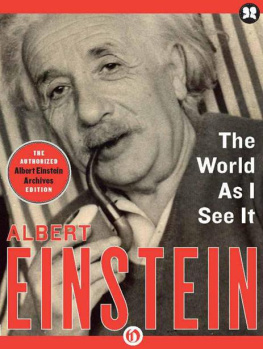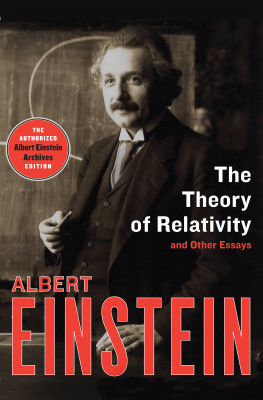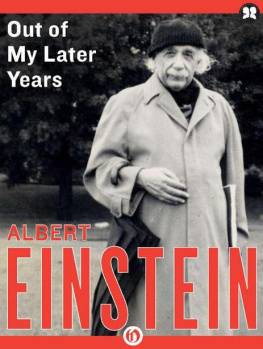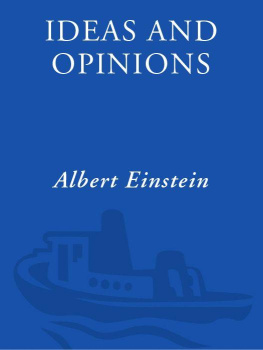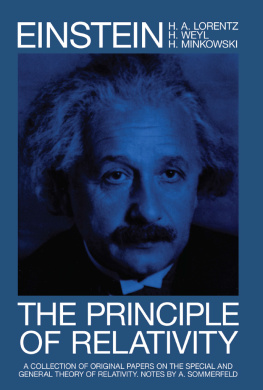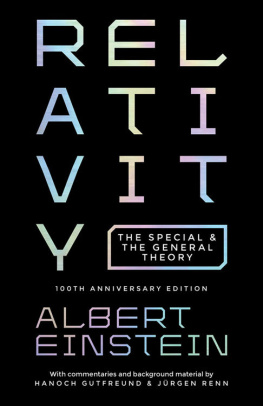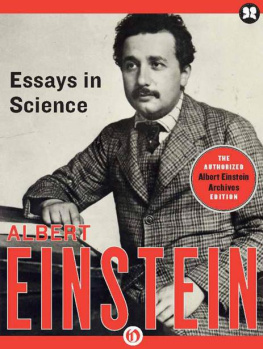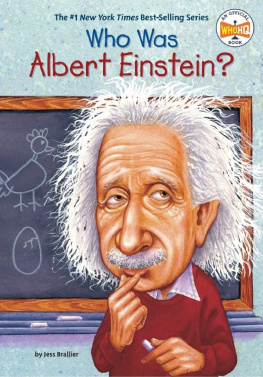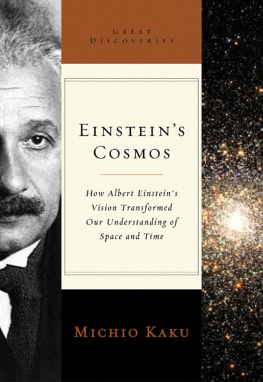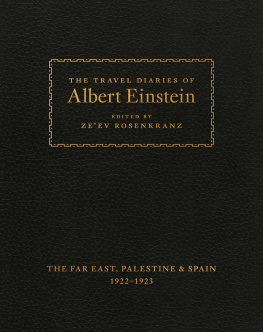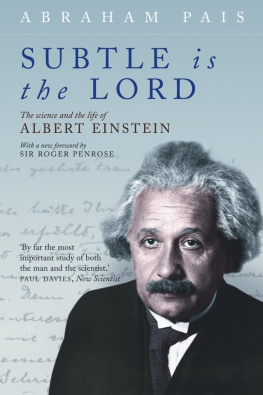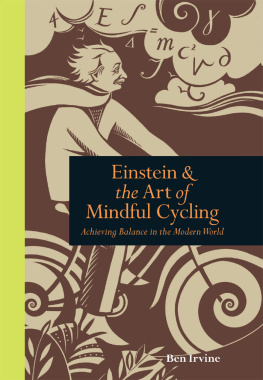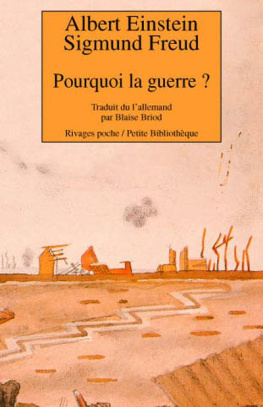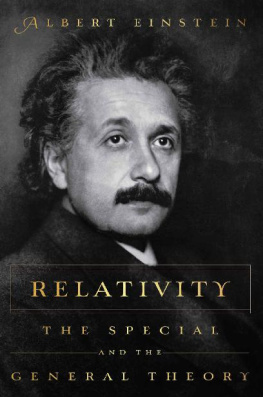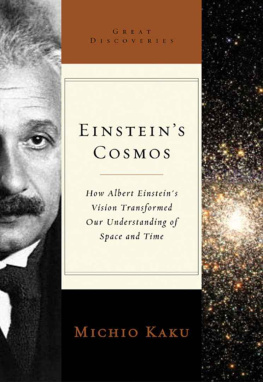Albert Einstein - The World As I See It
Here you can read online Albert Einstein - The World As I See It full text of the book (entire story) in english for free. Download pdf and epub, get meaning, cover and reviews about this ebook. year: 2011, publisher: Philosophical Library/Open Road, genre: Science. Description of the work, (preface) as well as reviews are available. Best literature library LitArk.com created for fans of good reading and offers a wide selection of genres:
Romance novel
Science fiction
Adventure
Detective
Science
History
Home and family
Prose
Art
Politics
Computer
Non-fiction
Religion
Business
Children
Humor
Choose a favorite category and find really read worthwhile books. Enjoy immersion in the world of imagination, feel the emotions of the characters or learn something new for yourself, make an fascinating discovery.
- Book:The World As I See It
- Author:
- Publisher:Philosophical Library/Open Road
- Genre:
- Year:2011
- Rating:5 / 5
- Favourites:Add to favourites
- Your mark:
- 100
- 1
- 2
- 3
- 4
- 5
The World As I See It: summary, description and annotation
We offer to read an annotation, description, summary or preface (depends on what the author of the book "The World As I See It" wrote himself). If you haven't found the necessary information about the book — write in the comments, we will try to find it.
The World As I See It — read online for free the complete book (whole text) full work
Below is the text of the book, divided by pages. System saving the place of the last page read, allows you to conveniently read the book "The World As I See It" online for free, without having to search again every time where you left off. Put a bookmark, and you can go to the page where you finished reading at any time.
Font size:
Interval:
Bookmark:
The World As I See It
Albert Einstein
Translated by Alan Harris

Contents
ONLY INDIVIDUALS HAVE a sense of responsibility.NIETZSCHE.
This book does not represent a complete collection of the articles, addresses, and pronouncements of Albert Einstein; it is a selection made with a definite objectnamely, to give a picture of a man. To-day this man is being drawn, contrary to his own intention, into the whirlpool of political passions and contemporary history. As a result, Einstein is experiencing the fate that so many of the great men of history experienced: his character and opinions are being exhibited to the world in an utterly distorted form.
To forestall this fate is the real object of this book. It meets a wish that has constantly been expressed both by Einsteins friends and by the wider public. It contains work belonging to the most various datesthe article on The International of Science dates from the year 1922, the address on The Principles of Scientific Research from 1923, the Letter to an Arab from 1930and the most various spheres, held together by the unity of the personality which stands behind all these utterances. Albert Einstein believes in humanity, in a peaceful world of mutual helpfulness, and in the high mission of science. This book is intended as a plea for this belief at a time which compels every one of us to overhaul his mental attitude and his ideas.
J. H.
ALBERT EINSTEIN WAS THE greatest physicist of the twentieth century. His image and name are recognizable to almost everyone, along with his equation E=mc2 , which describes the relationship between energy and mass. His impact on science and intellectual thought during his lifetime was profound.
This volume contains a collection of sixty-seven essays written before 1935, when Einstein was at the height of his scientific powers but not yet known as the sage of the atomic age. His stature in the world allowed him to express his views on social, philosophical, and political issues that were outside the field of physics. These essays established his early foray into these areas.
Why are we so interested in all aspects of Einsteins philosophical positions and his thought processes? His theories of relativity and universal gravitation are generally regarded as inaccessible to the ordinary person. Yet we know that he was an original thinker who was able to see beyond the conventional scientific worldview of his age. What is remarkable is that Einsteins greatest discoveries belong to him alone. It is perhaps fitting that this volume is being published one hundred years after Einstein settled the question of why the sky is blue. What we see is a giant intellect struggling as an ordinary person to make sense of the realities of life in the twentieth century.
This book is divided into four parts:
(1) The World as I See it (28 essays)
(2) Politics and Pacifism (25 essays)
(3) Germany (3 essays)
(4) The Jews (11 essays)
Some of the essays are letters to friends and strangers. Others are well thought out, closely reasoned treatises on topics such as: The Meaning of Life, Religion and Science, Fascism and Science, and Jewish Ideals.
The fundamental tenants of Einsteins philosophical positions are outlined clearly in several early essays. He indicated his indebtedness to Schopenhauer, the political ideal of democracy, his fundamental position of pacifism, and his understanding of his private religion.
Einsteins position was that everybody acts not only under external compulsion but also in accordance with inner necessity. This enabled him to later mitigate his sense of responsibility for his role in the start of the atomic age. We see in the second essay, The World as I See It, a succinct outline of Einsteins personal, religious, and scientific philosophy. It was his sense of wonder of the mysteries of experience which drove him toward his profound scientific achievements.
Much of the present volume represented a response to the world around him. A brief synopsis of the political events in Einsteins life until 1935 should help set the stage: Since Einstein had Swiss citizenship his absolute pacifism would have been a natural ethical position. In 1914 he signed a petition against Germanys acts of aggression leading up to the First World War. Soon after 1918 he accepted German citizenship in order to support the German Democratic Party and became an unofficial spokesman for the Weimar republic. He felt such a strong association with Germany that in 1921 he refused to attend the Solvay Congress in Belgium because other German scientists were excluded. He was very encouraged by the formation of the fledgling League of Nations in 1922, but was very troubled by the Leagues inability to respond to Frances occupation of the Ruhr. In 1922, he joined the Committee on Intellectual Cooperation, which was part of the League of Nations. It was within this context that he developed a correspondence with Sigmund Freud (To Sigmund Freud). In the period from 1922 through 1932 he broke with the League of Nations three times, the last being final. This was a testament to the conflict that he felt between his idealism and the reality of the political arena in which such an organization must work. An example appeared in his essay A Farewell.
After the First World War, Einstein was a willing associate of Zionism. In March 1921 Einstein made the first of many visits to America. His main purpose was to raise funds for the establishment of the planned Hebrew University of Jerusalem, as he outlines in Addresses on the Reconstruction in Palestine, which were written at different times and delivered in different places. It was on this first visit that he received the massive public adulation that marked the transformation of a great scientist into a controversial and historic twentieth-century icon and public figure.
Einstein characterized himself as a supporter of cultural and social Zionism, but not political Zionism, thus attempting to stay true to his distrust of nationalism. He wanted the Jews to solve the problem of living side by side with our brother the Arab in an open, generous and worthy manner (Addresses on the Reconstruction in Palestine II). This position of a pluralistic state was at direct odds to the Zionist political ideal. Einstein did not have the unquestioned support of the Jewish community in America, and his backing of the Zionist movement was criticized by many who felt that Jews should assimilate to society in America.
In 1933 the world was just coming out of the Great Depression. The political stability of Europe was in question. In America, Prohibition, which Einstein felt lowered the prestige of the government (Some Notes on My American Impressions), was about to be repealed and change was in the air. Anti-Semitism was developing in Germany. Fascism was on the rise in Italy. Einstein responded to these developments and weighed in without equivocation. He was still profoundly hopeful that Germany would see the error of her ways, and was reluctant to criticize Germany since he was a Jew and a German citizen. In his essay A Reply we can see the application of his personal philosophy to an issue where he clearly felt a strong sense of responsibility to speak out but did not.
His visits occasioned the essay Thanks to America in 1931 as he was leaving, followed by Some Notes on My American Impressions. It was not until 1932 that he was offered a post at Princeton. It became obvious to him that he could no longer remain in Berlin, and that year he left Germany, never to return. In 1933 he renounced his German citizenship and settled permanently in America. What particularly struck him about America was the American patronage of science. One can see why he readily agreed to adopt America as his new homeland.
Next pageFont size:
Interval:
Bookmark:
Similar books «The World As I See It»
Look at similar books to The World As I See It. We have selected literature similar in name and meaning in the hope of providing readers with more options to find new, interesting, not yet read works.
Discussion, reviews of the book The World As I See It and just readers' own opinions. Leave your comments, write what you think about the work, its meaning or the main characters. Specify what exactly you liked and what you didn't like, and why you think so.

